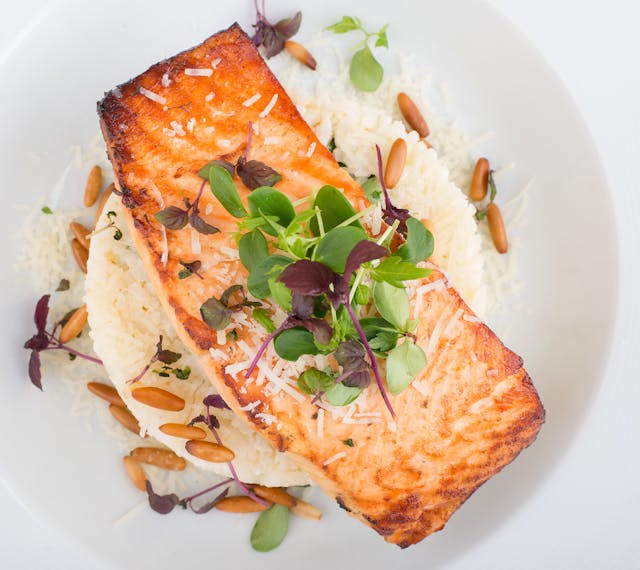Plant-forward eating is ideal for those who want the benefits of a predominantly plant-based diet without the pressure of giving up animal products entirely. It’s a flexible, realistic approach to food that fits into modern lifestyles—whether you’re cooking dinner for a mixed-diet family or simply craving a bacon sandwich on a Sunday. Rather than following a strict set of rules, plant-forward eating is all about intention and balance: putting vegetables, legumes, whole grains, nuts, and seeds at the heart of most meals, while leaving space for quality meat, fish, dairy, or eggs when it feels right for you.

Unlike rigid diets that can feel limiting or even stressful, plant-forward living offers nourishment without guilt. It encourages a gentle shift rather than an overhaul, making it easier to maintain over the long term. People who eat this way often find they naturally reduce their intake of red and processed meats, opting instead for protein-rich alternatives like beans, lentils, chickpeas, quinoa, tofu, or tempeh. These foods are packed with fibre, essential minerals, and plant compounds that support everything from heart health to stable energy levels. Studies show that plant-predominant diets are associated with a reduced risk of cardiovascular disease, thanks to lower saturated fat intake and higher antioxidant consumption (Satija et al., 2016, Journal of the American College of Cardiology).

Occasional animal products—especially oily fish, eggs, and grass-fed meat—can help ensure adequate levels of vitamin B12, vitamin D, iron, and omega-3 fatty acids, reducing the need for supplementation in many cases. Research published in Nutrients (2018) confirms that moderate intake of high-quality animal products can help prevent common nutrient deficiencies often seen in fully vegetarian or vegan diets, particularly B12 and iron.
The perks of eating this way go far beyond physical health. A predominantly plant-based plate often means better digestion, clearer skin, a lighter mental state, and a more consistent mood. That’s no coincidence—diets high in fibre and rich in antioxidants feed your gut microbiome, and a healthy gut is now widely understood to influence everything from immunity to mental well-being. The gut-brain axis, a concept explored in Nature Reviews Gastroenterology & Hepatology (2015), shows how diet influences serotonin production, inflammation, and even mood regulation through microbiota diversity (Cryan & Dinan, 2015).

Emerging research continues to show that plant-forward diets reduce the risk of chronic diseases such as heart disease, type 2 diabetes, and certain cancers, while also supporting healthy weight maintenance and cognitive function (Willett et al., 2019, The Lancet). In particular, the EAT-Lancet Commission supports a “planetary health diet” rich in plants with small, sustainable amounts of animal protein for optimal global and personal health.
From a sustainability perspective, choosing plant-based meals more often also has a gentler impact on the planet. Producing beans or vegetables typically uses far fewer resources than raising livestock, meaning each plant-forward choice can make a difference to environmental health too. According to the UN Food and Agriculture Organization, the livestock sector contributes approximately 14.5% of global greenhouse gas emissions—shifting to more plant-based meals is one of the most impactful ways individuals can reduce their carbon footprint (FAO, 2013).
Supplements can still play a supporting role, especially in winter months or during stressful periods when your immune system or energy levels need an extra boost. The most common additions for plant-forward eaters include vitamin B12 and vitamin D, particularly in countries with less sunlight. For those going several days without animal products, iron and omega-3s may also be worth considering. Fortunately, plant sources such as dark leafy greens, fortified plant milks, chia seeds, and flaxseeds provide excellent nutritional support. A review in Nutrients (2020) recommends thoughtful supplementation for those eating plant-heavy diets to maintain optimal wellness during seasonal changes or times of increased stress.

Ultimately, plant-forward eating is about flexibility, not perfection. It’s about giving yourself permission to enjoy food while prioritising health and sustainability. Whether you’re swapping out meat once a week or choosing a rainbow of veggies every day, this balanced way of eating allows room for tradition, celebration, and evolving personal needs, without sacrificing wellness.
Love Life x
References:
- Satija, A., et al. (2016). “Plant-Based Diets and Risk of Cardiovascular Disease: A Review.” JACC, 70(4), 411–422. https://doi.org/10.1016/j.jacc.2017.05.047
- Melina, V., et al. (2016). “Position of the Academy of Nutrition and Dietetics: Vegetarian Diets.” Journal of the Academy of Nutrition and Dietetics, 116(12), 1970–1980. https://doi.org/10.1016/j.jand.2016.09.025
- Cryan, J. F., & Dinan, T. G. (2015). “Gut microbiota: Microbiota and neuroimmune signalling—Metchnikoff to microglia.” Nature Reviews Gastroenterology & Hepatology, 12(9), 494–496. https://doi.org/10.1038/nrgastro.2015.124
- Willett, W., et al. (2019). “Food in the Anthropocene: The EAT–Lancet Commission on healthy diets from sustainable food systems.” The Lancet, 393(10170), 447–492. https://doi.org/10.1016/S0140-6736(18)31788-4
- FAO. (2013). “Tackling climate change through livestock: A global assessment of emissions and mitigation opportunities.” United Nations Food and Agriculture Organization.
- Schüpbach, R., et al. (2018). “Micronutrient Status and Intake in Omnivores, Vegetarians and Vegans in Switzerland.” Nutrients, 9(11), 1210. https://doi.org/10.3390/nu9111210
- Rogerson, D. (2020). “Vegan diets: practical advice for athletes and exercisers.” Journal of the International Society of Sports Nutrition, 14(1). https://doi.org/10.1186/s12970-017-0192-9

